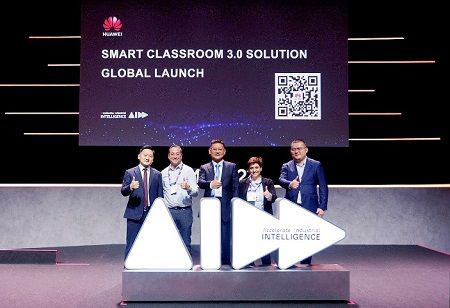Technological advancements and evolving learner needs are reshaping education, focusing on intelligent, adaptive, and personalized learning environments. Embracing this transformation, the are exploring future campus benefits and challenges. Huawei Smart Classroom 3.0 integrates technology for engaging, interactive learning. AI, IoT, and big data analytics optimize resources, enhance safety, and provide personalized learning experiences tailored to students' unique needs.
Huawei Smart Classroom 3.0 excels in its learner-centric approach. Utilizing AI-driven adaptive learning systems, it analyzes students' performance, learning styles, and preferences to offer tailored content and assessments. This enhances learning experiences and enables educators to effectively pinpoint and address individual learning gaps. Additionally, integrating immersive technologies like virtual reality (VR) and augmented reality (AR) provides hands-on, experiential learning, enhancing accessibility and engagement with complex concepts.
A collaborative approach involving multiple stakeholders is essential to fully leverage Smart Classroom 3.0. Governments are pivotal in formulating policies and frameworks that prioritize digital education and allocate resources for infrastructure development. Educational institutions must cultivate a culture of innovation and ongoing enhancement, investing in research and development to discover and apply optimal practices in technology-integrated learning. Meanwhile, private sector partners, including technology providers and educational solution developers, play a crucial role in innovating solutions tailored to the unique needs of learners and educators in the region.
Aligned with this vision, Huawei has introduced the Smart Classroom 3.0 solution tailored for the Middle East and Central Asia. This innovation was showcased at the Huawei Tech Carnival and Partner Summit 2024 in Baku, Azerbaijan. The solution promotes an interactive and intelligent teaching environment, empowering educators to explore new teaching approaches. This advancement aims to catalyze the intelligent evolution of education, elevating teaching methodologies and enriching student learning journeys.
Justin Sun Huan, Vice President, Enterprise Business Group, Huawei Middle East & Central Asia, stated, “Huawei’s smart classroom technology has shifted from purely digital to hybrid, resulting in Smart Classroom 3.0. This platform integrates AI and cloud computing to create a flexible and personalized teaching system while ensuring efficient and precise classroom management, offering a seamless end-to-end intelligence solution for teachers and students. Huawei, together with solution partners, will help customers build a robust digital infrastructure, develop smart classrooms, and digitize teaching processes. Our collective goal is to foster intelligent environments for scenario-based, experiential, and interactive teaching to elevate education and enhance research capabilities”.
Vusal Khanlarov, Head of the Education ICT Bureau, Azerbaijan Ministry of Science and Education, said, “As advanced ICT technologies continue to influence different areas of education, we see a shift from basic digitization to intelligent systems. Leveraging artificial intelligence, educators can tailor their teaching to be more personalized and differentiated, fostering the holistic development of students. We look forward to continuing our collaboration with Huawei to advance our digital transformation goals across the country”.
Mehedi Hasan Limon, Vice President, Education and Healthcare, Enterprise Business Group, Huawei Middle East and Central Asia, explained, “Huawei’s Smart Classroom 3.0 employs AI-based educational models to intelligently analyze and extract key course content while generating knowledge graphs that allow teachers to tailor lesson planning and enable students to learn in a more individualized manner. The system evaluates teaching activities and classroom dynamics, facilitating effective analysis and feedback to improve education management”.
As we progress towards Smart Classroom 3.0, placing the learner at the heart of our initiatives remains paramount. Our primary objective is to equip students with the skills, knowledge, and mindset essential for thriving in a digitally interconnected world. Huawei remains dedicated to innovating continuously within the education sector, advocating for the integration of intelligent technologies in education, advancing educational intelligence, and ensuring equitable access to high-quality education for all.

